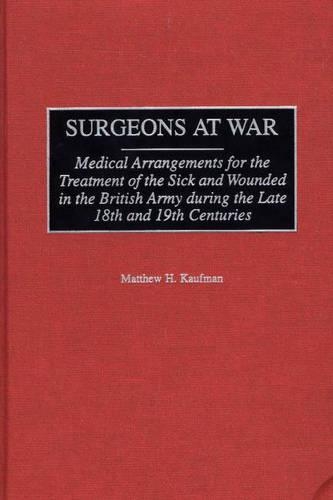
Surgeons at War: Medical Arrangements for the Treatment of the Sick and Wounded in the British Army during the late 18th and 19th Centuries
(Hardback)
Publishing Details
Surgeons at War: Medical Arrangements for the Treatment of the Sick and Wounded in the British Army during the late 18th and 19th Centuries
By (Author) Matthew Kaufman
Bloomsbury Publishing PLC
Praeger Publishers Inc
30th November 2000
United States
Classifications
Tertiary Education
Non Fiction
Land forces and warfare
European history
355.3450941
Physical Properties
Hardback
240
Width 156mm, Height 235mm
482g
Description
Kaufman examines the training and status of British military surgeons during the late 18th and 19th centuries. Their management of the sick and wounded during the wars with France leading up to and including the Peninsular War is also described. He concludes with an analysis of the medical problems associated with the Crimean War. Using important contemporary texts, Kaufman describes the personalities who served in the British Army Medical Department during the late 18th and 19th centuries, when diseases caused a much higher mortality that injuries sustained in battle. Many military surgeons were only poorly trained, and the management of the sick and wounded only gradually improved over this period despite significant advances in medicine, surgery and hygiene. Government spending cuts after the Peninsular War greatly depleted the medical service of the army so that by the time of the Crimean War it was unable to cope with a European-style war. Deficiences were recognized and, in the case of the medical services, this led to the establishment of the Army Medical School in 1860. This analysis should be of interest to serving military medical officers and to historians and other researchers interested in the management of 18th and 19th century armies in times of peace and war.
Reviews
.,."provides a useful account of the education and training of military and naval surgeons, and some reflections on the status of medical practitioners in both services...provides a good deal of useful information about British military and naval medicine."-Medical History
"One major omission from previous accounts is the full story of the formation, teaching contributions and surprising closure of the chairs of Military Surgery in Edinburgh and Dublin. Kaufman is to be congratulated for giving these chairs, established well before there was any thought of the provision of a proper site for military medical academic training in London, the place they deserve....[t]he story this book tells must be read."-Medicine Conflict & Survival
...provides a useful account of the education and training of military and naval surgeons, and some reflections on the status of medical practitioners in both services...provides a good deal of useful information about British military and naval medicine.-Medical History
[A]s it was the first war to come under the daily scrutiny of both press and public at home, the inadequacies in all respects of the medical services in the Crimea became a national scandal. The details and the consequences feature in this excellent highly readable study and how this resulted in the formation of a specialist Army Medical School and - at last - the Army Medical Corps.-Military Historical Society
One major omission from previous accounts is the full story of the formation, teaching contributions and surprising closure of the chairs of Military Surgery in Edinburgh and Dublin. Kaufman is to be congratulated for giving these chairs, established well before there was any thought of the provision of a proper site for military medical academic training in London, the place they deserve....[t]he story this book tells must be read.-Medicine Conflict & Survival
Historians will find Surgeons at War useful.-Army History
Historians will find Surgeons at War useful.Army History
"As it was the first war to come under the daily scrutiny of both press and public at home, the inadequacies in all respects of the medical services in the Crimea became a national scandal. The details and the consequences feature in this excellent highly readable study and how this resulted in the formation of a specialist Army Medical School and - at last - the Army Medical Corps."-Military Historical Society
..."provides a useful account of the education and training of military and naval surgeons, and some reflections on the status of medical practitioners in both services...provides a good deal of useful information about British military and naval medicine."-Medical History
"[A]s it was the first war to come under the daily scrutiny of both press and public at home, the inadequacies in all respects of the medical services in the Crimea became a national scandal. The details and the consequences feature in this excellent highly readable study and how this resulted in the formation of a specialist Army Medical School and - at last - the Army Medical Corps."-Military Historical Society
"Historians will find Surgeons at War useful."-Army History
Author Bio
MATTHEW H. KAUFMAN is Professor of Anatomy at the University of Edinburgh./e He has taught Anatomy and Embryology for more than 25 years, initially in the University of Cambridge and more recently in the University of Edinburgh. He has published a number of books and numerous papers that include a range of topics associated with the history of medicine.
